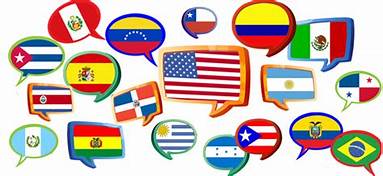
Hispanophones are estimated at 577 million including second-language speakers globally, making Latinos a political powerhouse.
Spanish the second most spoken language in terms of native speakers. Around 360 million live in Hispanic America and 45 million in Spain 70 million in Europe.
However, the Latin American and Caribbean population is equivalent to 8.42 percent of the total world population.
Generally speaking, the term "Hispanic" refers to the culture, people, and nations linked to Spain or the Spanish language. However, there is no technical definition of Hispanic, and considerable gray area exists regarding exactly who is or is not Hispanic. For example, the United States government has no official stance on what qualifies as Hispanic. A 1976 bill passed by Congress mentions "Americans of Spanish origin or descent," which would include some 20 Spanish-speaking countries (including Spain) but exclude Portuguese-speaking countries Brazil and Portugal. However, the U.S. Census Bureau takes an informal approach and simply asks people to self-report whether they are of Mexican; Puerto Rican; Cuban; or some other Hispanic, Latino, or Spanish origin.
Under this system, if a person wishes to be considered Hispanic, as 18.5 percent of U.S. residents did during the 2020 census, they are counted as such (note that country of origin is a factor, but the race is not). The reverse scenario is also true: If a person does not wish to be considered Hispanic, they needn't be. Hispanics can be of any race and have any country of origin or ancestry. Therefore, if a person of Asian descent who was adopted by first-generation Mexican immigrants in Southern California personally feels Hispanic, then can be. Similarly, someone whose mother is Hispanic, but who identifies more with their father's German-descended family in Wisconsin need not identify as Hispanic if they so desire.
This flexibility reflects current thinking from modern Hispanics themselves. In its 2015 National Survey of Latinos, the Pew Research Center found that only 17% of Hispanic adults felt that race was a factor in whether a person was Hispanic or not. In comparison, 29% of respondents felt it was largely a matter of ancestry and a full 42 percent felt that culture was the most important determining factor.
The difference between Hispanic and Latino
The terms Hispanic and Latino/Latina/Latinx are often used interchangeably, and they do overlap considerably. However, many population statisticians—as well as many people who count themselves within those categories—maintain that there are distinct differences between the two terms. Typically, the distinction is one of language versus location. Hispanic is the language-based term and describes people from Spain or another Spanish-speaking country, including (to most) Equatorial Guinea in Africa, but not Portugal or Brazil (which both speak Portuguese). By comparison, Latino/a/x is location-based and includes anyone whose family originates from Latin America regardless of the language spoken. Therefore, Latino includes Brazil, but not Spain or Portugal.
Despite its arguably finicky modern definition, the term Hispanic has roots that extend back to 200-300 BCE. It is derived from the Latin word Hispanicus, an adjective that referred to the region the Romans called Hispania: modern-day Spain, Andorra, Gibraltar, and part of France and Portugal.
It is also notable that a significant percentage of people who could be considered Hispanic and/or Latino actually prefer neither term. Instead, these people often prefer to be identified by their specific country of heritage. For example, a person from Peru prefers to be called Peruvian, a person from Chile prefers the term Chilean, and so on.
Modern Hispanic vs Latino Countries:
- Argentina
- Bolivia
- Chile
- Colombia
- Costa Rica
- Cuba
- Dominican Republic
- Ecuador
- El Salvador
- Equatorial Guinea
- Guatemala
- Honduras
- Mexico
- Nicaragua
- Panama
- Paraguay
- Peru
- Puerto Rico
- Spain
- Uruguay
- Venezuela
VS
- Argentina
- Bolivia
- Brazil
- Chile
- Colombia
- Costa Rica
- Cuba
- Dominican Republic
- Ecuador
- El Salvador
- Guatemala
- Haiti
- Honduras
- Mexico
- Nicaragua
- Panama
- Paraguay
- Peru
- Puerto Rico
- Uruguay
- Venezuela